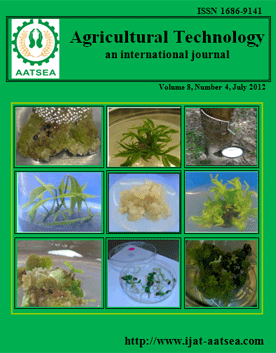ThaiScience
ThaiScience
INTERNATIONAL JOURNAL OF AGRICULTURAL TECHNOLOGY
Volume 14, No. 07, Month DECEMBER, Year 2018, Pages 2151 - 2162
Deproteinization in purification of exopolysaccharide from ophiocordyceps sinensis olive oil – stimulated culture
Thuy, H. L. T., Bao, C. H., Phuong, T. V. T., Lap, D. B., Hai, N. T. V., Minh, H. D. and Tien, T. N.
Abstract Download PDF
Exopolysacchride (EPS) extracted from O. sinensis culture supplemented olive oil is analyzed not only includes polysaccharides which also have links with proteins. In this study, we evaluated the deproteinization methods from the crude EPS to increase the efficiency of exopolysaccharide extraction, and not to affect the biological activity of polysaccharide, the methods used: Sevag method, TCA (trichloroacetic acid) method, and the enzymatic method. Results showed that using protease method for efficient removal of protein on extraction, purification, and biological activity was greater than the residual methods. Deproteinized EPSs separated by Sephadex G-100 gel filtration chromatography, we obtained two segments, EPS I and EPS II. In that, polysaccharide content increased from 34.1% to 82.33% (2.4 times) for EPS I, 78.98% (2.3 times) for EPS II, protein content significantly reduced when using protease from 3.57% to 0.002%; and 0.0067%, for EPS I, EPS II respectively. Besides the antioxidant activity of the EPS segments increased significantly compared with the raw EPS.
Keywords
deproteinization, purification, exopolysacchride, Ophiocordyceps sinensisINTERNATIONAL JOURNAL OF AGRICULTURAL TECHNOLOGY
Published by : Association of Agricultural Technology in Southeast Asia (AATSEA)
Contributions welcome at : http://www.ijat-aatsea.com
